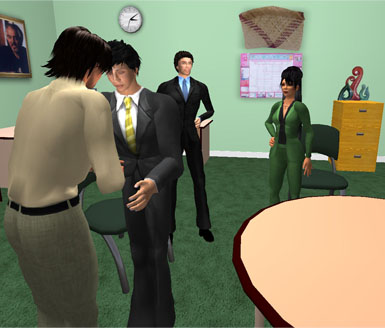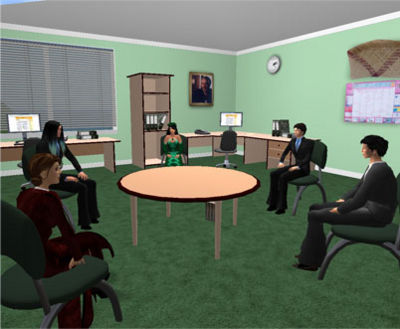Whānau fono interview
Content
This lesson utilises a specific Stage Two interview scenario, a whānau room constructed with the help and guidance of Te Kupenga o Hoturoa, Maori Health Provider. Students prepare for this interview as a group - the student who will be interviewed selects his/her support people and what roles they will take on for the role-play. All students have a chance to assess their perfomances and reflect on the benefits of a whānau interview.
Objectives
- Understand the skills required in an interview
- Understand the protocol to be followed in a whānau interview
- Participate in a whānau interview scenario in Second Life
- Self assess and reflect on interview performance
Resources
Book:
- Jones, Deborah (1997). The whaanau/support interview: A New Zealand contribution to cultural diversity. Employee Relations 19(4): 321-336
Handouts:
Web pages:
- What are the benefits of a whānau interview? (EEO: Equal Opportunities Employment Trust)
http://www.eeotrust.org.nz/toolkits/Maori.cfm?section=howtotapthepotentialofmaori#faq809
- Applying for University Positions/Whanau or other Support at Interviews(The University of Waikato)
http://www.waikato.ac.nz/hrm/vacancies/apply.shtml
- Graduate How to Apply/Whānau interview (Auckland City Council)
http://careers.aucklandcity.govt.nz/sitefiles/graduate-how_do_I_apply.html
Videos:
- Interview involving whānau support and support people (EEO Unit: IRD)
Other Resources:
The whānau interview script including procedure, mihi and karakia (included above under Handouts), as well as sound files of a couple of waiata (songs), is available in Second Life on the Hyperdome Console under Stage Two resources
Activities
Recap
- Review information on the 5th board of the Stairway of Learning - have students save the notecard to their inventories
- Discuss notecard content: what are the differences between other types of interview and the whānau interview? What are the benefits of the whānau interview?
- Watch the video 'Interview involving whānau support and support people' if available
Main activity
- The main activity will vary according to class needs and the number of students with knowlege of Māori tikanga (protocol) and ability to speak Te Reo
- If there are quite a Māori speakers/experts, ask their assistance to deliver the information - use them as teaching assistants and distribute them evenly around the class to assist the working groups
- If no Māori speakers/experts are available in the class, all parts of the interview process can be conducted in English, but the protocol needs to be understood and followed (the resources for whānau interviews contain mihi(speech(es)of greeting)and karakia (prayers)in Māori and also translated into English)
- The class can be divided into groups of approximately six members - half will be the interview panel and the other half will be the interviewee and support people
- The group needs to brainstorm and select the following:
- Roles for each group member - the main roles will be lead interviewer and interviewee, the second and possibly third interviewers will include the person who will mihi and offer karakia(either in Māori or in English)
- The interviewee and his support people need to discuss their roles together and the support people will need information from the interviewee so they have something they can contribute to the interview process and they also need to be clear as to who they are in relation to the interviewee
- The interviewers need to discuss their roles and be clear as to who will mihi/offer karakia, who will ask which questions (often in a whānau interview one interviewer will ask the basic/chatty questions and the other will ask the more bahavioural questions, or one will ask the life/interest questions and the other will ask qualifications/experience for the job questions)
- Allow the group time in the whānau room to run through the interview they have prepared
Reflection/evaluation
- Bring the class together to discuss the experience and how they felt about the interview process. They might consider questions such as:
- Was the whānau interview different to other interviews they have taken part in?
- What was it like having support? Did it make the experience easier/harder? Why?
- A brief reflection can be written on a note card of the experience and discussion
Variations
- The whānau room can be used to learn about/discuss/practise variations of the normal interview process eg. panel interviews and/or variations of the whānau interview eg. fono interview.
- If required a telephone interview room is also available for student use

